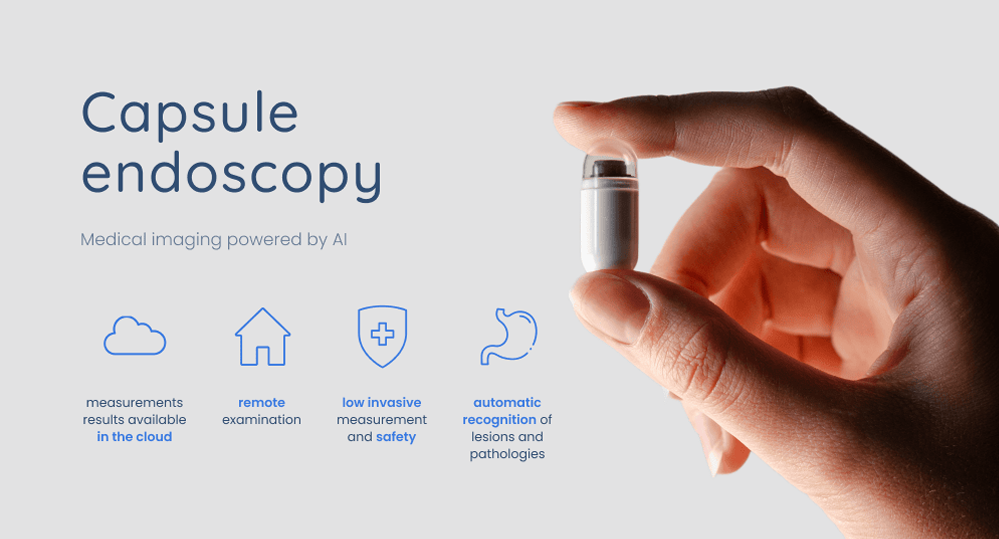Remote capsule endoscopy supported by AI

KEY INFORMATION
Healthcare - Medical Devices
TECHNOLOGY OVERVIEW
Capsule endoscopy is a non-invasive diagnostic method that utilizes a tiny, wireless camera capsule to capture images of the digestive system, which aids in identifying various conditions. Studies indicate that colon cancer is the leading cause of cancer-related deaths among men aged 20-49, and capsule endoscopy is the least invasive examination capable of detecting the early stages of this cancer, alongside other pathologies such as inflammatory bowel disease, ulcers, tumors, and gastro-intestinal bleeding. Without this procedure, these conditions often go undetected and become untreatable by the time noticeable symptoms appear.
This technology offer is a remote capsule endoscopy examination, aiming to make colon diagnosis more widespread among people and extend its use to animals, primarily pets like dogs. Regular capsule endoscopy colon screenings are the only way to prevent the growth of undetectable pathologies. Remote technology enables patients to move around or work without needing to stay in a medical facility, allowing diagnoses to be conducted in areas previously unreachable by capsule endoscopy, such as on battlefields, in underdeveloped regions, or even by astronauts in space. The system includes an artificial intelligence module that automatically identifies and suggests potential pathologies in the images to the examining physician. This information assists doctors in quickly navigating through the collection of images, and it can help detect pathologies that may necessitate a more invasive diagnosis or immediate treatment.
The technology owner is eager to engage in R&D collaboration with product development partners for gastro-intestinal endoscopic applications for both humans and animals.
TECHNOLOGY FEATURES & SPECIFICATIONS
The AI-supported remote endoscopic capsule system is an innovative medical technology boasting several key features, such as:
- Remote diagnosis and examination: This system enables capsule endoscopy diagnosis and examination to occur at any location with a stable internet connection, eliminating the need for a specialized medical facility.
- Expanded examination scope: The examination monitors not only the small intestine but also the large intestine and stomach.
- Affordability: Examination costs for patients are several times lower than traditional capsule endoscopy, as the system uses significantly more affordable microcontrollers instead of costly, dedicated electronic components.
- Automatic pathology recognition: The system employs artificial intelligence algorithms to automatically detect pathologies, assisting doctors in diagnosing and reducing examination analysis time by an average of 3-4 times.
- High image resolution: The capsule utilizes cutting-edge optical technologies, enabling it to capture images with 50% higher resolution compared to competitors.
- Cloud storage connectivity: The system comes equipped with cloud storage connectivity, allowing easy access to patient data and images from anywhere globally.
- 94% effectiveness: This indicates that the system is highly successful in identifying and diagnosing medical conditions.
- 97.4% sensitivity: This high sensitivity rate means that the system is highly accurate in detecting potential health issues.
POTENTIAL APPLICATIONS
This technology can be applied across various MedTech industry applications, such as:
- Gastroenterology: Useful for diagnosing and monitoring digestive tract conditions.
- Oncology: Valuable for detecting and monitoring cancers within the digestive tract.
- Sports Medicine: Applicable for diagnosing and monitoring injuries, including concussions, in sports medicine.
- Veterinary Medicine: Beneficial for diagnosing and monitoring digestive tract conditions in animals.
This technology can also be further refined for use in the following applications:
- Industrial Inspection: Applicable in industries like oil and gas, aerospace, and manufacturing for remote visual inspections of internal structures and components, including pipelines, engines, and turbines.
- Military and Defense: Suitable for military and defence applications, such as inspecting hard-to-reach areas in aircraft or other vehicles.
Unique Value Proposition
The technology offer boasts the following distinctive features:
- Remote control access: Accessible from any location worldwide with an internet connection.
- Affordability: Holds the potential to become a regular diagnostic tool.
- Minimally invasive: Eliminates the need for sedation or physically inserting a camera into the body, offering a less invasive alternative to traditional endoscopy procedures.
- Comfort: The procedure is painless and comfortable, with no requirement for anesthesia or sedation.
- Diagnostic accuracy: Delivers detailed images of the gastrointestinal tract that may not be visible using traditional endoscopy procedures, making it valuable for diagnosing conditions like inflammatory bowel disease, ulcers, and tumors.
- Convenience: Capsule endoscopy can be conducted in an outpatient setting, allowing patients to resume their normal activities immediately following the procedure.
The technology owner is eager to engage in R&D collaboration with product development partners for gastro-intestinal endoscopic applications for both humans and animals.
